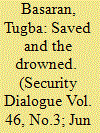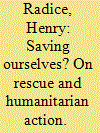|
|
|
Sort Order |
|
|
|
Items / Page
|
|
|
|
|
|
|
| Srl | Item |
| 1 |
ID:
149466


|
|
|
|
|
| Summary/Abstract |
The Japanese decision to surrender on 15 August 1945 created an extraordinary and unique situation in the Chinese province of Manchuria. Within hours of the Japanese surrender, a number of special American intelligence teams parachuted into Manchuria to gain information on the POW’s and Soviet intentions for postwar Asia. This paper will examine on what occurred when Soviet and American military personnel met in Manchuria. Both sides had very different goals and aims for the end of war. For the small American force assigned to locate and identify Allied POW’s, their mission exemplified the already strained relations between the United States and the Soviet Union. For nearly every instance of cordial and joyous meetings between the two sides there were equally difficult confrontations and misunderstandings. These encounters offered a preview into the coming Cold War in Asia.
|
|
|
|
|
|
|
|
|
|
|
|
|
|
|
|
| 2 |
ID:
165799


|
|
|
|
|
| Summary/Abstract |
In September 1918, the medical personnel from Soochow Medical College for Women, a Southern Methodist missionary medical school in Suzhou, China, set out for Vladivostok, Siberia, in response to a call from the newly established American Red Cross unit to aid with the refugee emergency in that city. While the Red Cross had originally been set up to help with the medical needs of the Czechoslovakian and anti-Bolshevik Russian military forces then controlling Siberia and of the American Expeditionary Forces, the refugees who had fled from the Bolshevik controlled regions of Russia to Siberia constituted a humanitarian crisis that came to form a major part of the work of the Red Cross. Because of their relative proximity to Siberia, most of the original medical personnel were “recruited from among American expat missionary and medical communities and their native employees” in East Asia, the Philippines, and Hawaii.1 The Red Cross asked the women missionary physicians at the Soochow Medical College for Women to come to Vladivostok to take care of the women and children refugees. After some consideration, two American women physicians, an American nurse, two Chinese women physicians, and one Chinese woman pharmacist who had been trained at the school, along with the five women medical students and five nursing students, left for Vladivostok in September, remaining for six months until April of 1919.
|
|
|
|
|
|
|
|
|
|
|
|
|
|
|
|
| 3 |
ID:
139411


|
|
|
|
|
| Summary/Abstract |
The duty to render assistance at sea appears to be a well-established humanitarian norm; nonetheless, in 2011 alone more than 1500 people drowned in the Mediterranean. Witnesses recount that many could have been rescued if fellow seafarers had not ignored their pleas for help. Struggling to understand failures to rescue, many seek to portray indifference as individual failure from the norm. In contrast hereto, this article provides an insight into the governing of indifference in contemporary liberal societies - that is, how people are guided towards becoming indifferent to the lives and sufferings of particular populations. Thus, my focus will be on the workings of law and its potential to produce collective indifference. The drowned, I argue, are not casualties of individual immoral behaviour; through a system of sanctions, fellow human beings are encouraged to look away and even to let people die at borders in the name of security. This not only dilutes the legal duty to rescue but has also had a detrimental impact upon the normative landscape, leading to a distinction between worthy lives that fall within the duty to rescue and charitable lives becoming a question of benevolence.
|
|
|
|
|
|
|
|
|
|
|
|
|
|
|
|
| 4 |
ID:
164986


|
|
|
|
|
| Summary/Abstract |
This article contributes to the international political theory of humanitarianism by unpicking the politics of humanitarian action’s simplest expression: saving human lives in the name of humanity. Both saving lives and defining notions of common humanity are closely interrelated acts of power. What saving a life means depends on a prior definition of humanity; humanitarians’ acts of rescue are the measure of their commitment to humanity. The politics of rescue and the politics of humanity are inextricably linked. The article explores four facets of this nexus. First, it considers the meanings of rescue, from saving bodies to saving lives, linked to contingent understandings of humanity. Second, it turns to the rescuers, for whom rescue performs particular functions, not least the need to preserve a sense of self. Third, it situates their often narcissistic motives in relation to the consequences of humanitarian action. Fourth, it addresses the power imbalance inherent in rescue and the problem of causing harm. It concludes that rescue is always an act of presumption, but one that can be tempered by humanitarian actors willing to embrace their role as ‘moral politicians’ (Walzer), aware of their power and their dirty hands, and open to contrasting understandings of humanity.
|
|
|
|
|
|
|
|
|
|
|
|
|
|
|
|
| 5 |
ID:
161916


|
|
|
|
|
| Summary/Abstract |
The authors cover the organization of search & rescue support for Navy activities in the Arctic. They emphasize the issue of rescuing the crew from a distressed submarine under ice. The authors suggest using specialized rescue equipment to provide assistance to the Navy in the Arctic.
|
|
|
|
|
|
|
|
|
|
|
|
|
|
|
|
| 6 |
ID:
098501


|
|
|
| 7 |
ID:
153748


|
|
|
|
|
| Summary/Abstract |
The authors review the issue of rescuing personnel from submarines in the emergence situations in the Arctic latitudes and the role played by specialized submarines rescuing submariners, including actions under the ice.
|
|
|
|
|
|
|
|
|
|
|
|
|
|
|
|
|
|
|
|
|